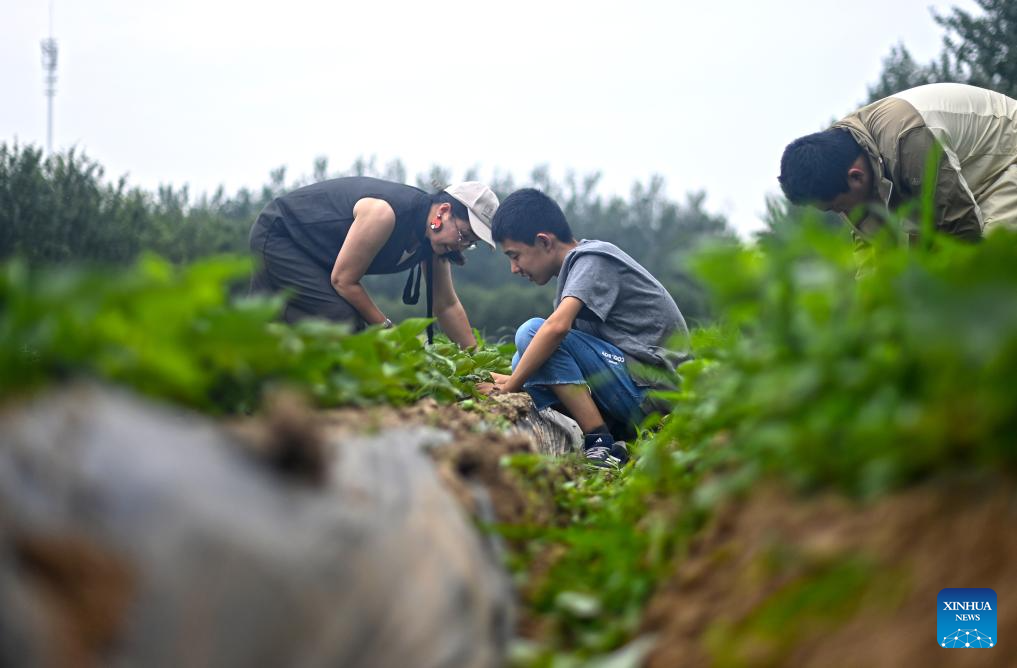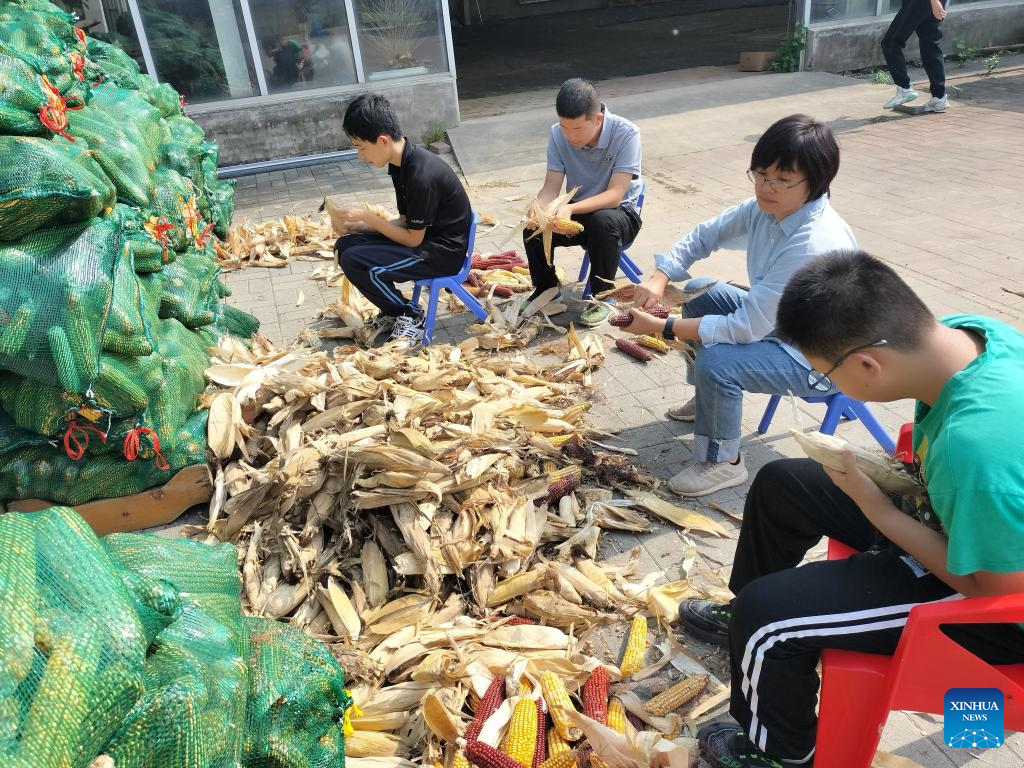Across China: Youths with autism harvest corn, hope on north China farm
Source: Xinhua
Editor: huaxia
2025-10-11 23:02:15

An autistic teenager (C) and his parent (L) weed at Hui'ai Farm in Xiqing District, north China's Tianjin, May 31, 2025. (Xinhua/Zhao Zishuo)
TIANJIN, Oct. 11 (Xinhua) -- On a sunny autumn day, teenagers and their parents were busy harvesting corn and sweet potatoes on a piece of farmland in north China's Tianjin Municipality.
"We ate the corn we grew ourselves. It's very yummy," said Yunyao, a pseudonym, who is a 17-year-old autistic youth, smiling shyly as he shucked corn.
Located in Tianjin's Xiqing District, Hui'ai Farm, which translates to a farm that collects love, was established by eight families with autistic or intellectually disabled children.
Yunyao's father, Zhu Xijun, is one of the founders of the farm. Since leasing this land in October 2024, the once formally dressed lawyer has been wearing simple clothes and spending his days working in the fields.
"I don't expect the farm to make money. The children are past school age, so they need something to do," he explained.
Autism spectrum disorder (ASD) involves challenges with social communication, repetitive behaviors and emotional abnormalities. The China Disabled Persons' Federation said in 2023 that the country had 13 million people diagnosed with ASD.
Guan Xiaoyan, another founder of the farm, had to quit her job as a software operations engineer to take care of her son, who was diagnosed with autism at age three.
Guan noticed that, after the boy stayed home following junior high graduation, the life skills and behavioral abilities he had worked hard to learn had begun to regress.
"I felt I could neither care for him properly nor take care of myself," Guan, 50, recalled.
Guan's 17-year-old son, once withdrawn and burdened by family tensions, has begun opening up through his work on the farm. "Through chores, he has learned cooperation, built healthy habits and is now more willing to play with others," she said.
Stressing the importance of socialization and life skills for these young people, Zhu explained that they run the farm together to harness the proven value of work in autism rehabilitation.
"Developing work habits is vital for fostering self-care abilities. Through labor, the youths interact with friends and family using language, actions and emotions. This process keeps them happy while improving their life skills," he said.
The farm has received support from enterprises. Liu Zhiqiang, a 60-year-old villager with limb disability from a nearby disability assistance base, goes to the farm to assist with weeding and thinning of seedlings. During the just-concluded National Day holiday, he and several others from the base came daily to help.
"In the past, we were always the ones receiving help. Now, we can use our strengths to help these children, and it feels truly wonderful," Liu said.
In recent years, China has continuously improved early screening, diagnosis and rehabilitation for ASD. Support services like inclusive education and rehabilitation therapy have seen progress, offering more help to children with autism.
At the same time, the government and other organizations are supporting families with autistic children to pool resources to create job opportunities for this disabled group. A national policy, launched in February 2024, encourages HR agencies to provide disabled employment services.
Under the support of the China Disabled Persons' Federation, Xihaner car wash, a project initiated in the southern Chinese city of Shenzhen in which employees with autism, Down syndrome and cerebral palsy are hired, has been promoted nationwide -- with dozens of car wash centers opened and hundreds of mentally disabled people employed in many cities, including east China's Nanjing and Hefei, and Chifeng in north China.
In Tianjin's Baodi District, an employment base for people with disabilities, including a laundry business, has helped 68 disabled individuals gain both income and self-confidence.
This year, Hui'ai Farm yielded over 500 kg of corn and more than 15,000 kg of sweet potatoes -- a harvest that has brought immense joy to the autistic youths, as they have witnessed the fruits of their own labor.
"We hope to develop some high-value-added agricultural products here in the future. This will allow the youths to enhance their skills while also improving the farm's self-sustainability, ultimately helping more people with mental challenges," Zhu said. ■

Autistic teenagers and a teacher (2nd R) peel corn at Hui'ai Farm in Xiqing District, north China's Tianjin, Sept. 30, 2025. (Xinhua)



